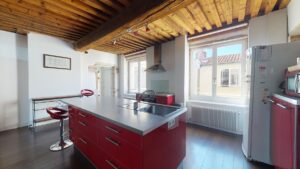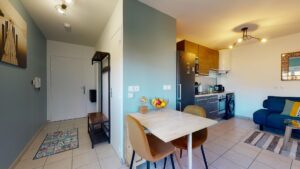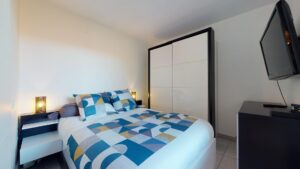What is a security deposit ?
- At the start of the stay, the tenant pays a security deposit to the owner in order to handle potential damages that could be caused in the rented appartment, or to its objects.
- The amount of the security deposit is mentionend on each flat’s web page.
- The owner will refund the security deposit to the tenant 10 days after the check-out at the latest, after substracting costs of possible works and replacements of damaged or missing goods .
How to pay the security deposit ?
- In cash.
- By bank check onto a French bank account, handed in by the start of the stay.
The check is not cashed and will be given back to the tenant at the end of their stay. - By bank transfer, at least 4 days before the start of the contract.
- By signing a document that authorizes your credit card to be debitted.
The card will be debitted for a maximum amount mentioned on the apartment’s web page, and only when damages have been noted in the apartment at the moment of the check-out.
More information on the security deposit
The security deposit is often confused with the guarantor, but they are two different things.
The guarantor is a third party who undertakes to take charge of any rental debts of the tenant of a dwelling in the event of non-payment of their rent.
The guarantor can be a person but also an organization, a bank or a company. The use of this type of aid is very regulated by law.
Usually a member of the tenant’s family or a relative acts as a “guarantor”.
If the guarantor is a person, the apartment’s owner (lessor) may require the guarantor to present supporting documents t to constitute the file. It is therefore necessary and preferable for the guarantor to be solvent: indeed, if the tenant doesn’t pay, it is the guarantor who will have to take charge of the unpaid rents. Earning at least three times the rent amount is therefore usually a requirement.
In the case of seasonal rental and also for temporary stays, a guarantor is not required. In fact, weekly rentals are not subject to the same rules as furnished yearly rentals.
The security deposit, on the other hand, is a sum of money that is required of the tenant in order to make them mindful of taking good care of the home and furniture.
If the lessor requires the payment of a security deposit, its amount must be mentioned in the lease contract.
In the event of payment in cash, the tenant can request a receipt from the owner.
The amount of the security deposit may not be subject to any revision during the rental or at the renewal of the contract.
The requirements and regulations in terms of the security deposit differ, depending on each type of rental: unfurnished rental, traditional furnished yearly rental, furnished and equipped weekly rental (also known as seasonal rental), furnished and equipped monthly rental (mobility lease).
For unfurnished rental, the amount of the security deposit is limited to a 1 month’s rent excluding charges.
In furnished yearly rental, it is limited to a two months’ rent excluding charges since the Alur law.
Regarding weekly rentals, the amount is freely fixed by the owner.
As part of the furnished and equipped rental via Urban Sejour, the occupant must be particularly careful not to damage the furniture, the floor and the walls, household appliances or other installations.
The accommodations offered by Urban Sejour are decorated with care, according to the personal tastes of each owner.
As a result, the amount of security deposits varies, depending on the type of accommodation.
Whether the stay is short, medium or long, an inventory ought to be signed between the tenant and the owner (or their representative). This allows both parties to protect themselves in the event of litigation.
It is important to note that for a good, fast and above all effective verification of the premises and for editing the inventory of fixtures, it is recommended to leave the flat in a good state of cleanliness.
The dishes must be clean and tidy, the must be furniture returned to its original place. The clean sheets and towels have to be placed in the cupboard and the dirty sheets left on the bed or in the bathroom.
In this way, the verification of the premises is very simple and the security deposit can be returned immediately.




